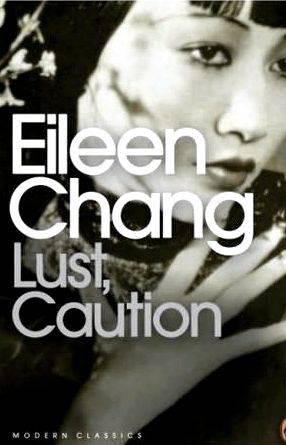

This book review was published in The Star on 30 September 2007. Th e print version comes with a 25% discount voucher for the book which can be us ed at Kinokuniya KLCC.
WHEN I read a while back that Taiwanese director Ang Lee was making a movie that had some of its scenes shot in Penang and Ipoh (and being an Ipoh guy myself), I made a mental note to find out exactly what movie he was making then, like the forgetful dolt I am, I proceeded to forget all about it.
Much later, I chanced upon the movie trailer online, and realised this must be the movie that Lee had shot on our shores. The trailer looked interesting, promising an intriguing cinema experience and it played to my fancy with its period setting and sensuous scenes.
The movie, Lust, Caution, stars Tony Leung, Joan Chen and Wang Leehom and features the debut of mainland China actress Tang Wei. Based on a short story by famed author Eileen Chang (known to Chinese readers as Zhang Ailing), the movie was adapted for the screen by long-time Lee collaborators, Wang Hui Ling and James Schamus.
As the movie is based on a short story, I knew the publishers would take advantage of the movie release and repackage the short story as a film tie-in. But as film tie-ins go, this one’s quite the odd one.
The film tie-ins that I’m used to are usually big-sized paperbacks printed on glossy paper. You know, the ones where almost every page boasts full colour pictures and concept art, and that are almost always touted as &”The Making Of&” but never really give any substantial insight into the moviemaking process.

This movie-tie in, however, is different. It has been published in a nice hardcover format that will probably appeal more to bibliophiles rather than film fans.

Perhaps the publishers were targeting the admirers of Chang’s literary works?
Well, if that’s the case, the discerning Chang fan should find this book quite worth the while, for not only does it boast a handsome exterior, the content provides a compelling reading experience.
The book includes not only the original Chang short story, but also a well-written preface by Lee himself, an introduction by Schamus, an essay by Julia Lovell (who translated the short story into English) and the entire film screenplay, as well as various production notes by the film crew.
Chang’s short story is set in Hong Kong and Shanghai at the time of the Japanese occupation during World War II and concerns a group of student actors in a theatre club who also happen to be nationalists. The group chooses its best actress and prettiest girl, Wang Chia-Chih, to pose as a rich businessman’s wife in short, a tai tai to gain the confidence, and eventually the lust, of Mr Yee, spymaster for the Japanese collaborationist government. The plan is for Wang to use her wiles on him and set him up to be assassinated.
The story is elegant and atmospheric, and convincingly builds tension at every turn. Of course, quoting a few brief paragraphs can never do Eileen Chang any justice; you really need to read the story as a whole to feel the tightness of the tension inherent in the situation.
The screenplay follows Chang’s story faithfully, and adds some elements that, in my opinion, improves the flow of the story and depth of the characters.

Initially, I thought I would not get much out of reading the screenplay. After all, it’s just a rehash of the short story I just read, right? Well, I found myself surprised that I was quickly engrossed once again in Chang’s 1940s Hong Kong and Shanghai. It will be interesting indeed to see how Lee translates the screenplay to the big screen.
But to me, the section with production notes is really the most appealing in this book. Various members of the crew write about their experience working on the set of Lust, Caution, making this part a sort of diary and allowing us a rare, in-depth look into the making of the film.
The crew write about the problems, and their satisfaction in overcoming those problems, of building a set that would bring back Shanghai of 1942, searching for the perfect actor to portray the beautiful and innocent Wang Chia-Chih, designing the rigging of lighting that would turn Tony Leung into the evil Mr Yee, editing a movie in a language you don’t speak or understand, etc.
There’s another book that’s also a Lust, Caution film tie-in but it only provides the short story in a paperback format. It’s cheaper than this book, which is a thick hardcover, but, personally, I think the hardcover gives better value for the price you pay. The production notes and the various other extras peppered within make for entertaining reading and you would miss all that in the paperback. And it has the bonus of looking good on your bookshelf as well.
—
For an opinion of the movie itself, check out our good friend Swifty, who’s written a pretty good review .
I’m not sure if this book even needs an introduction. With all the fanfare the book’s been getting, I think anyone with a decent Internet connection and/or reads Off the Edge should know what this book’s all about. Heck, even the title’s a dead giveaway.
But here I go anyway. Malaysian Politicians Say the Darndest Things presents to its readers various quotes by Malaysian politicians that were said between the late 70s to earlier this year. Compiled by the incomparable Amir Muhammad, director of the infamous Last Communist that got banned last year, the quotes obviously aren’t just any old random quote but are what Amir calls “Outrageous Quotes”.
Amir describes the Outrageous Quote as ” something undiplomatic about gender or race, or it might smack of a certain ignorance of due process and rule of law. It would get civil libertarians in a twist, or a funk, or some other dance music-like word. Outrage would be expressed; a befitting response, you would say to an Outrageous. “
An example of an Outrageous Quote would be something like this:
“He is not clever at doing it. to be a fraudster you need skills. Fraudsters should always be a notch above their victims. He didn’t learn from me or I could have given him some tips. As a father I am disappointed.”
– Senator Muhammad Abdul Ghani, implicating his son in a scandal of cloned Approved Permits (APs) for imported cars. (The New Straits Times, 11 October 2006) Each page boasts one Outrageous Quote (sometimes even two or three related quotes), accompanied by an explanation of the context of the quote written by Amir, as well as a humourous illustration by the talented Shahril Nizam. Shahril Nizam’s illustrations as well as the overall book design complements the surrealism and weirdness of the world these politicians seem to live in. His strange yet appealing art style gives a book a certain kind of style that adds to the book’s charm.
I must say that Amir Muhammad has stumbled upon a brilliant idea. Malaysians, in general, love simple books (preferably ones that require less reading and contain more illustrations). Combine that concept with the really weird things our politicians keep spouting out from day to day, and you have the basis of what I would consider the definitive Malaysian Joke Book.
The book is funny, well-executed and well worth getting. Looks pretty neat on your bookshelf too, so be sure to buy your own copy!
“Otters are not trainable,” [Gaiman] explains. “Dogs are trainable – if you want them to sit you train them and give them rewards and they sit each time. But otters. if they do something cool and you give them a fish, the next time they’ll do something even cooler. Or they’ll try to do something completely different. I think that most writers – or at least a lot of us – are otters.”
Now that we’re sending Muslims up into space, the West seems to be amused with the fact that our very own Muslim scientists have drafted up guides on worshipping procedures in space. Wired’s got an article worth reading about the problems in facing the kiblat and how to find Mecca from space:
Dr. Kamal Abdali, a cartographer who is also Muslim and who has written (.pdf) extensively on determining the qibla, favors the great circle route, but adds, “Prayer is not supposed to be a gymnastic exercise. One is supposed to concentrate on the prayer rather the exact orientation.” He points out that in a train or plane, it’s customary to start in the qibla direction but then continue the prayer without worrying about possible changes in position.
But how does that work in space? Mathematically, Shukor would need to place both ISS and Mecca on the same imaginary sphere — by either comparing the place on Earth directly beneath ISS with the real Ka’aba, or by projecting the Ka’aba into space (the option recommended by the Fatwa Council).
Yet the option to pray while facing a point in space brings up another problem. Muslims face the ground to pray, in part to avoid any hint of pagan sun or moon worship (“Prostrate yourselves not to the sun nor to the moon, but prostrate yourselves to Allah Who created them, if you (really) worship Him” (The Quran, Fussilat 41:37). If the Ka’aba projection happens to line up with the sun or moon, purists might believe the prayer invalid.
Huh. So, our bold Angkasawan has to take care that while praying he doesn’t end up worshipping a stray heavenly body instead and finding himself being accused of idolatry, one of the worst sins a Muslim could ever commit.
Wednesday, 19 September 2007
It’s old news now, but I guess I was a little shocked that Robert Jordan passed away.
I’m not even a fan but I do have friends who are, and I empathise. It sure would suck being a fan, knowing he was already writing the final book of an already too drawn out fantasy epic, but didn’t manage to finish.
The best write-up I’ve seen online on all this has to be on The Wertzone.
Mark Coggins takes a look at Raymond Chandler’s writing process for The Long Goodbye :
Chandler’s method of rewriting was radical. Rather than keeping most of what was in his current draft and making accretive changes to it, he started nearly from scratch, saving only the few words or phrases that resonated from the previous draft. Returning to the movie making metaphor, Chandler’s rewrites were truly more akin to alternative takes where the director encouraged the actors to take a different line through the scene.
Friday, 14 September 2007
Gah! I actually missed Roald Dahl Day yesterday! I think it’s high time I got around to using Google Calendar. or any calendar for that matter.
To mark Roald Dahl Day this year, I thought I’d show you a book of his which has special meaning to me– Rhyme Stew. Long-time readers of my blog would know why this particular Roald Dahl book is special (though of course all Dahl books are equally special to me, Rhyme Stew being a little more equal than the others); I have a first edition of the book which was personally signed by the man himself, as detailed in last year’s Roald Dahl Day post .
Here is the state of the cover as it is now:
Previous answers to this question
This is a preview of an assignment submitted on our website by a student. If you need help with this question or any assignment help, click on the order button below and get started. We guarantee authentic, quality, 100% plagiarism free work or your money back.
 Get The Answer
Get The Answer